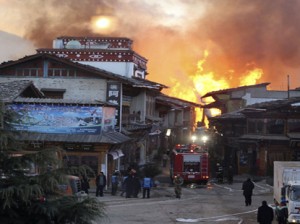 The Tibetan Center for Human Rights and Democracy (TCHRD) released its 2012 report on the state of human rights in Tibet on 1/17/13. Their conclusion is the inarguable worsening of human rights abuses in the Chinese-occupied region, with on-going police brutality, arbitrary detentions, disappearances, torture and sentencing of Tibetans accused of “splittist” activities.
The Tibetan Center for Human Rights and Democracy (TCHRD) released its 2012 report on the state of human rights in Tibet on 1/17/13. Their conclusion is the inarguable worsening of human rights abuses in the Chinese-occupied region, with on-going police brutality, arbitrary detentions, disappearances, torture and sentencing of Tibetans accused of “splittist” activities.
2012 also saw an increase in restrictions on freedom of religion and expression, freedom of movement (particuarly Amdoans, Khampas, and resettled nomads), and access to Tibetan language and education. Border security has increased, resulting in only 374 escaped Tibetans in 2012, as opposed to almost 600 in 2011. Chinese authorities added 269 (known) political prisoners this year, bringing the (known) total to 988. The Peoples Republic of China (PRC) has also increased ‘patriotic re-education’ and ‘legal education’ campaigns targeted at Tibetan monastic communities, and these campaigns are now reportedly present in all monasteries and nunneries in TAR (Tibetan Autonomous Region).
Human rights watchers, reporters, and international investigations are completely banned in the area, and every internet cafe is strictly monitored. “Even the inaccessible North Korea boasts more international media presence than the Tibetan capital,” TCHRD points out.
Looking forward to 2013, the report condemns China’s new National Human Rights Action Plan, which states that “[t]he Chinese government respects the principle of universality of human rights, but also upholds proceeding from China’s national conditions and new realities.” TCHRD states: “This type of opting out of their own human rights action plan is a step in the wrong direction for human rights in Tibet and China.”
The report also describes the model of ‘stability preservation’ (weiwen) as deeply embedded in Chinese society and government Xie Yue, professor of political science in China, cautioned Reuters that “[t]he whole model of ‘stability preservation’ is part and parcel of the mode of rule, not the work of just one man.” Additionally, China has amped up its domestic security, increasing their budget by almost 12%, an additional $113 billion.
The outlook of 2013, with new Chinese leadership but increased focus on oppression of human rights, remains murky.




 Print
Print Email
Email